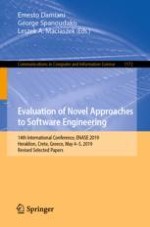2020 | OriginalPaper | Buchkapitel
Automated Software Measurement Strategies Elaboration Using Unsupervised Learning Data Analysis
verfasst von : Sarah A. Dahab, Stephane Maag
Erschienen in: Evaluation of Novel Approaches to Software Engineering
Aktivieren Sie unsere intelligente Suche, um passende Fachinhalte oder Patente zu finden.
Wählen Sie Textabschnitte aus um mit Künstlicher Intelligenz passenden Patente zu finden. powered by
Markieren Sie Textabschnitte, um KI-gestützt weitere passende Inhalte zu finden. powered by
